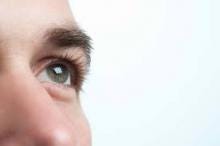"Eye:" More than Seeing
In ancient Greek, the word “to have seen” also means “to know.” Seeing is the path to knowing. An eye is the path to seeing.
This brings us to the Greek word for “eye,” ophthalmos (ὀφθαλμός). It is familiar because it is the root for many English words relating to sight, including “optometrist.” However, it is also the root of words that we do not connect with seeing at all. One is the word “optimism,” which comes to us via the Latin optimum, which means “best.” How do we get from “eye” to “best?” This happens because ophthalmos has several meanings that our word “eye” doesn’t have.
The Many Meanings of “Eye”
Jesus uses ophthalmos in twenty-six verses. This word means both “eye” and “sight.” However, the word also means “the dearest,” and “the best” because the eye is the most precious part of the body. It is from this meaning that Latin gets optimum, the “best.” It also means "light," "cheer," and "comfort." This “light” has the sense of being “light-hearted“ whose connection to the light of seeing is less obvious. In English, we use the “light” it has the sense of “not heavy.” That doesn’t work as well in Greek.
Ophthalmos also has a number of specific uses that are interesting. The phrase "the eye," as in “the eye is watching” meant the eye of a ruler or master or the eye of the Divine. The “king's eye” was a confidential officer who reported about what was going on in a kingdom, the head of his intelligence agency. The eye of the sky was the sun. The eye of the evening was the moon. Of course, to the Greeks, the sun and moon were divine as well.
Jesus’s Use of the Word
As with so many of Jesus’s words, we cannot understand his meaning without his larger context. For example, we have Matthew 5:38:
NIV: You have heard that it was said, ‘Eye for eye, and tooth for tooth.
Here, his context isn’t just Exodus 21:24 from the Greek Old Testament, but the hidden meanings of “eye” in his language. In this verse, Jesus is emphasizing the meaning of “eye” both as the most valuable part of the body and also as a metaphor for cheer and comfort. This emphasis is made clear by juxtaposing ophthalmos with the Greek word for “tooth.” The Greek word was the metaphor for pain and grief. Teeth were considered the worst parts of the body because they rotted, caused pain, and fell out. The Old Testament verses used the words “eye” and “tooth” in two separate verses so we didn’t have this contrast. Jesus puts them together to create this sense of balancing the most valuable things and the most worthless ones.
Now, a tougher question: does an eye give off light? I wonder what people normally think Jesus means when he says, Matthew 6:22:
NIV: The eye is the lamp of the body. If your eyes are healthy, your whole body will be full of light.
However, this verse needs clarification by a more complete and careful translation.
Listeners Heard: The lamp of the body of work is the eye. When, in fact, that eye of yours is focused, that whole body of work of yours will be a shining light.
(NOTE: For an understanding of “body of work” and the “that whole body of yours,” see this article.)
Here, we must examine the Greek word for “light.” There is an obvious connection between eyes and light because the eye perceives light. One of the meanings of “light” in Greek is “publicity,” or more precisely, “public knowledge” (not publicity as advertising). The Greek “light” also works a bit like how we describe learning as “shedding light” on a topic. When Jesus says a “shining light,” his meaning “public knowledge” was clear to his listeners.
Next question: how is the eye a “lamp,” a source of light? It is a very specific kind of lamp, one that sheds light on our minds and our understanding by allowing us to see the world. Again, we must remember that “to have seen” also means “to know.” The lamp of the eye does not shine outside our bodies. It enlightens us on the inside, letting the light shine in.
So, if we see clearly, we will learn what is good and that will shine in what we do. The eye gives us the light of knowledge, and what we do shares that light with others. Our bodies shine through our actions, but our actions shine from what we learn through our eyes.
The Problems with Eyes
Jesus also notes how eyes can mislead us. For example, in Matthew 6:23, the counter verse to the one above.
NIV: But if your eyes are unhealthy, your whole body will be full of darkness. If then the light within you is darkness, how great is that darkness!
Listeners Heard: When, however, that eye of yours is worthless, that whole body of yours will be blind. If in fact that light, the one within you, is dark, that darkness is how great?
Notice how his statement: an eye is worthless. But it is the most valuable part of our bodies. How can it be worthless? Even more confusing, how can a light be dark? Jesus usually used “light” as the opposite of “dark (see this article). This is even more confusing that an eye being a lamp. What does Jesus mean?
Keep reading with a 7-day free trial
Subscribe to Rediscovering Jesus's Words to keep reading this post and get 7 days of free access to the full post archives.




